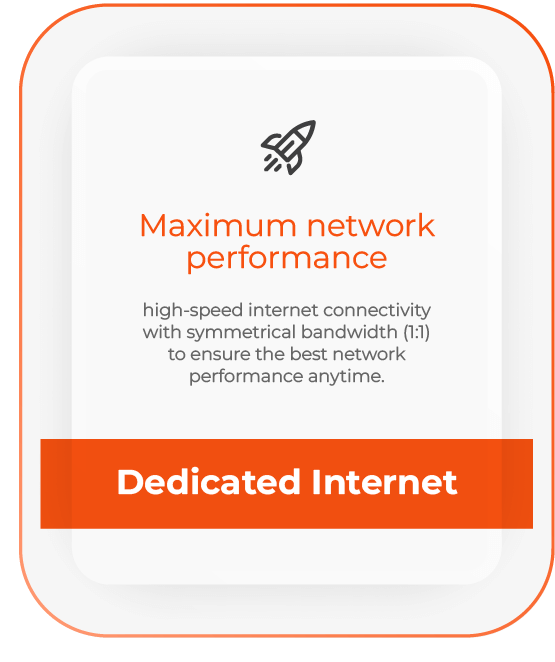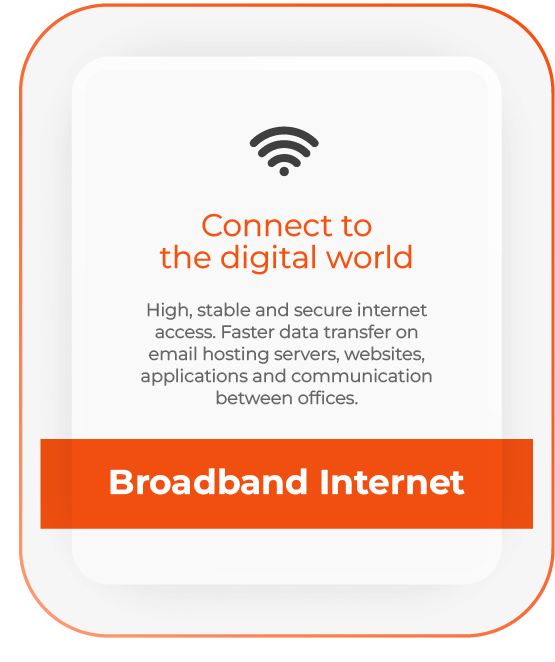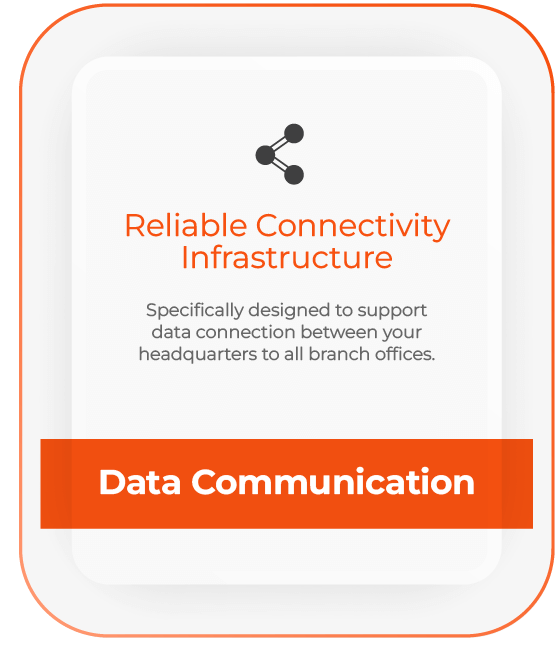The 1st commercial Internet Service Provider in Indonesia

Need more advanced connectivity?
Cloud Exchange is an advanced interconnection solution that enables seamless and direct access to multiple clouds and data center, across multiple networks.
By adopting Network Managed Services, companies can optimize operational efficiency, reduce risk, and deliver a better experience to end users through a reliable, secure, and always available network.
In the ever-evolving digital era, efficient network management has become a critical element in business success. A well-functioning network is not just technological infrastructure, but also the backbone that supports various operational and strategic aspects of the company.
Efficient network management is not just about avoiding technical issues, but also about realizing the full potential of technology in supporting business goals. Investments in robust network infrastructure and quality management services help companies stay competitive in an increasingly competitive business environment and evolving technology.
Understand the various Network Managed Service services, in optimizing your network management through the articles below:
What are Network Managed Services?
Network Managed Services is a strategic approach to managing an organization’s network infrastructure. This involves outsourcing operational, monitoring, maintenance and network optimization responsibilities to expert service providers. In this model, the service provider takes over some or all of the network-related tasks.
The service provider will manage the hardware, software, network performance monitoring, security, troubleshooting, and updates. This frees up internal teams to focus on innovation and core business activities. These services may include management of local networks, wide area networks (WANs), wireless networks, and cloud services.
The benefits of Network Managed Services include reduced internal workload, improved quality of service, and increased security. With 24/7 monitoring, potential disruptions can be detected and resolved more quickly. However, provider selection should take into account reputation, experience and suitability of services to the organization’s specific needs.
Efficient network management has a far-reaching impact on several important areas in business:
Operational Performance
A well-managed network ensures seamless connectivity between various systems and devices. This drives operational process efficiency, such as internal communications, data sharing, and team collaboration. Good network speed and quality helps avoid interruptions that can hinder productivity.
Increased Innovation
A stable and secure network is the foundation for technological innovation. Companies can develop and implement new solutions, such as intelligent business applications, advanced data analytics, and cloud-based technologies, all of which require a robust network infrastructure.
Customer Experience
Poor network management can negatively impact customer experience. Slow online service, repeated downtime, or security issues can reduce customer trust and damage a company’s image.
Data Security
An efficient network also means better data protection. Proper network management can identify potential threats, implement countermeasures, and provide layers of protection against cyberattacks and data breaches.
Informational Decision Making
Efficient network management supports the smooth flow of information across the organization. This allows leaders to make decisions that are based on actual and accurate data.
Business Scalability
A well-managed network can be easily scaled to support business growth. As a company grows, a flexible network infrastructure can quickly adapt to changing needs.
Main Components of Network Managed Services
The main components of Network Managed Services involve various aspects designed to ensure smooth, secure, and optimal performance of an organization’s network infrastructure. Some of the key components included in this service include:
Proactive Monitoring
Service providers will continue to monitor network performance proactively. They will detect potential issues, anomalies or failures before they impact business operations, enabling quick remedial action.
Hardware and Software Management
This includes managing, configuring, updating, and routine maintenance of hardware (such as routers, switches, firewalls) and software (such as operating systems and applications) connected to the network.
Network Security
The service provider will implement security measures to protect the network from cyber threats. This involves traffic monitoring, security updates, attack monitoring, and incident response actions.
Capacity Management
Maintain adequate network capacity to avoid overutilization or bottlenecks that can affect performance. Proper monitoring of resource usage and scalability is part of this component.
Updates and Maintenance
Perform regular software and hardware updates to maintain security, performance and compatibility. This also includes fixing identified problems.
Change Management
Manage changes in network infrastructure by coordinating configuration changes, migration, or addition of new devices with minimal impact on operations.
Disaster Recovery and Incident Recovery
Prepare a disaster recovery plan to address possible damage from natural disasters or cyber attacks. Quick response is also provided when an incident occurs.
Documentation and Reporting
Records information related to configuration, maintenance, and changes made to the network. Periodic reports are provided to provide insight into network performance and status.
Customer service
Provide responsive customer service based support. This includes assisting with questions, problems, or requests from parties using the network.
Performance Optimization
Perform analysis and actions to improve network efficiency, latency and speed, and provide recommendations for continuous improvement.
Compliance and Regulation
Ensure that the network complies with applicable rules and regulations in a particular industry or region.
There are several types of Network Managed Services offered by service providers to help organizations manage and optimize their network infrastructure. Here are some of the main types:
Local Network Management (LAN)
Focus on managing local network infrastructure within buildings or limited locations. This includes devices such as switches, routers, and Wi-Fi access points.
Wide Area Network (WAN) Management
Concerned with managing networks that connect several different geographic locations, such as company branches. This involves managing connections, traffic, and security between locations.
Wireless Network Management
Involves managing wireless infrastructure, including setting up and monitoring Wi-Fi networks and addressing performance and security issues.
Cloud Network Management
Focus on managing networks connected to cloud services. This includes configuration, security, monitoring, and performance optimization for cloud-hosted services.
Network Security Management
Specializes in securing networks from cyber threats. This involves attack monitoring, intrusion detection, and protection against malware as well as attack prevention efforts.
Network Performance Monitoring
Focus on continuous monitoring of network performance, including latency, bandwidth, and network response. The goal is to ensure the network operates efficiently and adequately.
Disaster Recovery and Incident Recovery
Provides solutions for data and network infrastructure recovery after natural disasters, hardware failures or cyberattacks.
Hardware and Software Management
Concerned with the configuration, monitoring and routine maintenance of hardware and software in the network.
VoIP Service Management
Focus on managing voice communications services over IP networks, including call quality management, integration, and maintenance.
CDN Service Management
Manage Content Delivery Network (CDN) services to ensure fast and efficient delivery of web content to users in various locations.
Traffic Optimization Management
Concerned with network traffic management and optimization, including providing priority for critical applications and managing traffic bottlenecks.
Identity and Network Access Management
Provide solutions to manage user access to networks and resources in accordance with existing regulations and policies.
Network Managed Services offer a variety of benefits to organizations that adopt them. Here are some of the main advantages of using this service:
Operational Efficiency
By shifting network management responsibilities to expert service providers, organizations can reduce internal workload. This allows internal teams to focus on core business activities rather than spending valuable time on technical maintenance.
Higher Quality of Service
Service providers usually have the latest resources and technology to better manage the network. This results in better network performance, higher availability, and a better user experience.
24/7 monitoring
These services generally provide 24/7 network monitoring. This means potential problems can be detected and addressed before they disrupt business operations. This helps reduce unplanned downtime.
Enhanced Security
Service providers focus on strong network security. They identify and address cyber threats, implement security updates, and ensure compliance with security best practices.
Predictable Costs
These services often have predictable cost models, such as monthly or annual fees. This allows organizations to manage budgets more effectively without the surprise of unexpected additional costs.
Flexibility and Scalability
These services can be easily adapted to growth or changing business needs. This provides the flexibility to change network capacity or implement new technologies without large investments in hardware and personnel.
Increased Focus on Core Business
By relying on service providers to manage the network, companies can focus more on innovation, product development and business strategy rather than technical matters.
Access to Technical Expertise
Organizations gain access to a team of experts trained in managing and optimizing networks. This eliminates the need to recruit and train internal resources with the same level of expertise.
Latest Technology Updates
Service providers continuously monitor the latest technological developments and implement them in your network. This helps keep organizations one step ahead in terms of innovation.
Better Compliance
Service providers often have a better understanding of the regulations and compliance relevant to your business, helping to ensure that the network is in appropriate compliance.
Faster Disaster Recovery
With a well-prepared and tested disaster recovery plan, organizations can recover more quickly from major disruptions such as natural disasters or cyberattacks.
Considerations in Selecting a Network Managed Services Provider
Choosing a Network Managed Services provider is an important decision that impacts your network performance and business operations. Here are some key considerations to consider when choosing this service provider:
Skills and Experience
Check the provider’s track record in managing the network. Consider how long they have been in business and whether they have experience in your industry.
Range of Services
Make sure the provider can support the type of network (LAN, WAN, wireless, cloud, etc.) you need. They should be able to provide services that suit the scope and needs of your business.
24/7 Monitoring
Make sure the provider offers continuous network monitoring around the clock. Their ability to detect and respond quickly to problems is critical.
Security
Consider the provider’s approach to network security. They should have strong security measures in place to protect your data and infrastructure from cyber threats.
Disaster Recovery and Incident Recovery
Make sure the provider has a good disaster recovery plan and has tested the process. This is important to minimize the impact of downtime in emergency situations.
Service Quality
Review the level of service offered by the provider. Do they have a clear SLA (Service Level Agreement)? How do they handle customer questions or problems?
Scalability
Make sure the provider can accommodate your business growth. They must be able to easily adjust network capacity as needs change.
Cost
Consider the provider’s cost model. Is it a monthly, annual or other fee? Make sure you understand the fee structure and what it includes.
Reputation
Do research on the provider’s reputation. Read customer reviews, look for references, and learn about projects they’ve completed.
Technical Capabilities
Consider whether the provider has technical capabilities appropriate to the technology used in your network environment.
Obedience
If you operate in a highly regulated industry, ensure the provider has an understanding of relevant compliance and is able to comply with the rules.
Physical Location
Consider whether the provider’s physical location is close to your location or is in a geographic area that can provide prompt support and response.
Technology Update
Ensure providers stay up to date with the latest technology developments and implement innovative solutions in their services.
Transparency
Choose a provider that is transparent in communications and provides visibility into network performance and the management activities they perform.
Indonet Network Managed Service
Indonet’s Network Managed Service is a world-class solution designed to help companies optimize their network operations. With a skilled and experienced approach, Indonet offers proactive 24/7 monitoring, routine maintenance and strong security protection.
Relying on the latest technology and a team of experts, this service provides significant benefits, including increased operational efficiency, higher service quality and rapid disaster recovery. Indonet also offers exceptional scalability, allowing companies to expand their networks as their business grows. With this service, companies can shift the burden of network management to experts, so they can focus on innovation, business development and providing a better experience to customers.
Network Managed Services is a strategic approach in managing an organization’s network structure. This involves delegating operational, monitoring, maintenance and network upgrade tasks to competent service providers.
All Network Managed Service components work together to create a stable, secure and optimal network environment that supports business objectives and is able to meet the challenges of modern technology. It is important to choose the type of Network Managed Services that best suits your organization’s needs and ensure that the service provider has the right expertise and experience in your chosen field.
By adopting Network Managed Services, organizations can optimize their network performance, increase operational efficiency, and reduce risks associated with network management. Carefully considering these aspects will help you choose a Network Managed Services provider that fits your business needs and provides reliable, quality service.
Indonet’s Network Managed Service is a global solution designed to help companies improve the operational efficiency of their networks. With a skilled and experienced approach, Indonet provides 24/7 active monitoring, regular maintenance and solid security protection.






